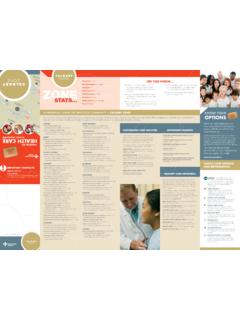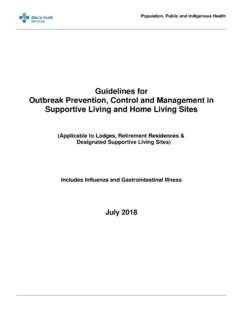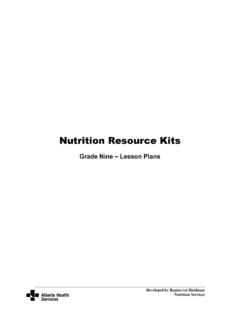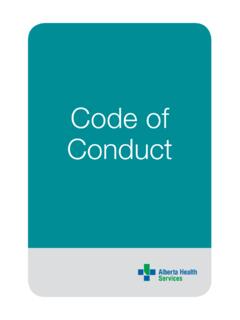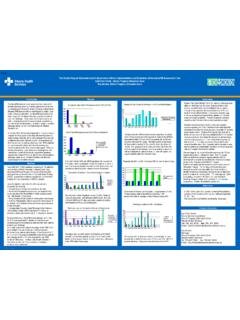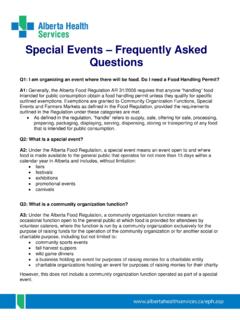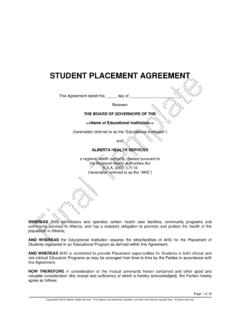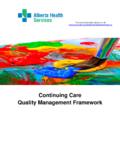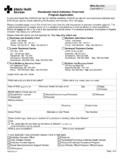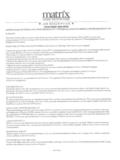Transcription of Health Care Aide Role in Medication Assistance
1 Health Care Aide Role in Medication Assistance A Companion to the Alberta Provincial Continuing Care Medication Assistance Program (MAP) Manual Updated March 1, 2016. HCA Role in Medication Assistance Acknowledgements This document has been prepared by the AHS Continuing Care Medication Management Committee for the purpose of supporting continuing care service providers. We would like to extend our sincere thanks to all staff and partners who contributed to the development of this educational material. Chair Kathryn Brandt, Director Practice Development, Provincial Seniors Health Note: this document will be reviewed and updated periodically. If you printed this document from an online source it is considered valid only on the day that it was printed.
2 After this date, please refer back to the online document to ensure you are using the most up to date copy. The information contained in this document was created expressly for use by the continuing care sector in Alberta. Any adoption/use/modification of this document is done so at the risk of the adopting organization. Alberta Health Services accepts no responsibility for any modification and/or redistribution and is not liable in any way for any actions taken by individuals based on the information herein, or for any inaccuracies, errors, or omissions in the information in this document. Page 2. HCA Role in Medication Assistance Table of Contents Introduction.
3 4. Medication Assistance vs. Administration ..4. Conditions for HCA Involvement in Medication Assistance ..5. Nurse and HCA Responsibilities ..6. Medication Assistance by HCAs ..6. Basic Skills .. 6. Restricted Activities ..8. PRN medications ..12. FAQs ..13. References ..15. Page 3. HCA Role in Medication Assistance Introduction Health Care Aide (HCA) is the generic term used to describe unregulated, entry-level Health workers who perform tasks identified in the Health Care Aides Competency The title used may be determined by individual employers ( , Nursing Attendant, Home Support Aide, Disability Support Worker, etc.).2 HCAs are an integral member of the Health care team, and may be involved in assisting clients to meet their Medication support needs.
4 Certified HCAs are instructed in theory and skills based on the Government of Alberta Provincial Health Care Aide Curriculum (hereafter referred to as the HCA Curriculum'). Unregulated workers not certified or deemed substantially equivalent are required to demonstrate their knowledge and skills through successful completion of the HCA Competency Assessment Profile (CAP) and a learning plan. Those with less than 500 hours previous experience are encouraged to pursue The purpose of this document is to consolidate the governance documents that define the full range of Medication Assistance activities that the HCA is potentially able to participate in, and the contextual circumstances required to support these activities.
5 Specific page references are included to facilitate easy access to the original sources of information. Medication Assistance vs. Administration Medication support is described as a spectrum of services provided to the client to ensure medications are taken by the client as intended by the prescriber .3 Different levels of support may be provided by different team members working in collaboration according to scope of practice and role function. While the terms Medication Assistance ' and Medication administration' are sometimes used interchangeably, it is important to differentiate between these terms in order to appreciate the different level of responsibility and accountability between HCAs and regulated nurses (RN, RPN and LPN) when it comes to Medication support activities.
6 Medication Assistance is a service provided to clients to ensure Medication is taken as intended by the prescriber when the client is assessed as being unable to independently take his or her own medications safely. This may include opening packages of Medication and providing medications to the client for immediate ingestion, application, inhalation, insertion, instillation or injection. Medication Assistance includes a range of activities from verbal reminders to full hands-on Assistance and observation. It may support individuals, or may involve groups of clients through delivery of pass medications. Medication Assistance is carried out by a nursing professional, and may be assigned to an unregulated care provider when it is safe and appropriate to do so.
7 Clients requiring Medication Assistance recognize the need to take medications and consent to the Assistance provided. Clients unable to take their own medications because of cognitive impairment may have Medication Assistance assigned to an 1. Alberta Health & Wellness (November 2001). Health Care Aides Competency Profile 2. AHS Seniors Health (2012). Hiring Standards for Employers of Health Care Aids (HCAs) working in Continuing Care 3. Pg. 29 - Health Quality Council of Alberta (2012). Medication Management Checklist for Supportive Living Page 4. HCA Role in Medication Assistance unregulated care provider when a Health care professional has assessed it is safe to do so and when the client does not refuse to take the Medication administration is the activity of supplying to a client a dose of a Medication for the purpose of immediate ingestion, application, inhalation, insertion, instillation or injection.
8 It is more than just the psychomotor task of giving a Medication to a client. It is a cognitive and interactive aspect of nursing care and involves assessing the client, making clinical decisions and planning care based on this assessment. Medication administration requires the knowledge and skills of a nursing professional, and is beyond the role of the HCA. 5. The HCA providing Medication Assistance must be supervised by a regulated nurse. The regulated nurse is also responsible for communicating with other Health care team members, including the physician/prescriber and/or the pharmacist. Note: nurse is a protected title under the Health Professions Act and may only be used by regulated members of CARNA, CLPNA or Conditions for HCA Involvement in Medication Assistance Employers are responsible for the assignment of work ensuring HCAs are individually competent to perform the work, regardless of their educational background or work HCAs are responsible for identifying when they do not have the required knowledge/skill to perform the assigned task, and to ask for help if they are The following four conditions must all be met in order to support HCA involvement in Medication support activities: 1.
9 HCA job description must state that Medication Assistance is included in the HCA roles and responsibilities. 2. Employer policies and procedures must specifically describe how Medication related tasks are to be done safely including the type of Medication system used and the types of medications with which HCAs can assist, including use of PRNs. They should indicate approved abbreviations and medical terms, types of forms and documentation, and how supervision will be carried out. 3. Appropriate HCA education and training must include the knowledge, skills, and attitudes required to safely assist with medications, and what to do in specific situations.
10 4. Ongoing supervision must be provided, whether direct or indirect, from a regulated Health -care professional ( , RN, RPN or LPN).8. 4. Pg. 28 - Health Quality Council of Alberta (2012). Medication Management Checklist for Supportive Living. 5. Pg. 27 - Health Quality Council of Alberta (2012). Medication Management Checklist for Supportive Living. 6. Pg. 1 - CARNA, CLPNA, CRPNA (2010). Decision-Making Standards for Nurses in the Supervision of Health Care Aides. 7. AHS Seniors Health (2012). Hiring Standards for Employers of Health Care Aids (HCAs) working in Continuing Care 8. Pg. 11 - Assisting with Medication Delivery (May 2013), 2010 HCA Government of Alberta Provincial Curriculum (July 2013).
